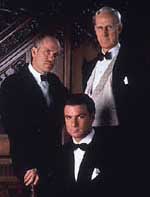
To appreciate the true wigginess of RKO 281 (Saturday, November 20; 8 to 9:30 p.m.; HBO), it may help to think of William Randolph Hearst as Big Tobacco, Hollywood as CBS, Orson Welles as Lowell Bergman, Herman Mankiewicz as Jeffrey Wigand, either the Mercury Theatre or RKO as 60 Minutes, and Citizen Kane as The Insider. Marion Davies is nicotine. On the other hand, maybe not. Nicotine could also be Rosebud. Neither Mike Wallace nor Don Hewitt really shapes up as studio boss George Schaefer. The Lowell Bergman Al Pacino gives us in The Insider comes on surprisingly like the Joan of Arc Luc Besson gives us in The Messenger. All arguments from analogy are bogus. And sometimes a movie is just a cigar.
What happened in 1996 was that Ridley Scott (Blade Runner, Alien, Thelma and Louise) saw the dramatic possibilities in a public-television documentary, The Battle Over Citizen Kane, about Hearst’s attempt in 1941 to strangle Orson in his cradle. By 1997, Scott had a script from John Logan (Gladiator, Any Given Sunday), after which Su Armstrong (Good Will Hunting) signed on as the producer and Benjamin Ross (The Young Poisoner’s Handbook) as the director, for HBO. To save money, RKO 281 – “281” was the number assigned to the super-secret Citizen Kane production – was shot in London, where various rooms in Leighton House, Guild Hall, and the Victoria and Albert Museum simulated San Simeon. But the team seem to have had no trouble at all enticing acting talent into the fold.
Liev Schreiber plays Welles, the enfant terrible of the Mercury Theater and War of the Worlds – “Maestro, the Dog-Faced Boy,” John Houseman called him – like a King Baby, as if the needy ego were not to be distinguished from an open wound. (Hollywood hated the latest genius from the snobby East before he even got started; at all costs, he had to dazzle.) John Malkovich is a wonderfully sly “Mank” Mankiewicz, the alcoholic screenwriter who, as Pauline Kael has persuaded us in The Citizen Kane Book (1971), wrote every word of the shooting script, no matter what Welles said later – and who included in that script biographical stuff from Welles as well as Hearst. (On the downslide of a smart-aleck career that had taken him from the Algonquin to a swimming pool at the dawn of the talkies, the self-destructive Mank had also been one of Hearst’s pet wits at the Court of San Simeon.) James Cromwell gives us a press baron more sympathetic than the man deserves; Hearst may not have smoked or drunk, and certainly loved Marion, but he was as crazy and corrupt as any Roman emperor. Whereas Roy Scheider gives us a Schaefer, who brought Welles to Hollywood in the first place, less sympathetic than he deserves. (Schaefer opened Citizen Kane in spite of Hearst, without consulting his board of directors.) And Melanie Griffith suggests a Marion Davies who drinks as much as Mank and was a lot nicer than she was made out to be in Kane (and who was, in fact, a terrific comic actress).
Even the supporting roles are cunningly cast, from Fiona Shaw as Hedda Hopper, who sneaks into a preview and then tittle-tattles to the castle on the telephone, to Liam Cunningham as Gregg Toland, who taught Welles everything about cinematography Orson would later imagine he’d invented himself. David Suchet is in perfect Hercule Poirot form as Louis B. Mayer, who, under threat of blackmail by Hearst (kinky candids, tabloid anti-Semitism), organizes a cabal of studio satraps to pony up $800,000 to purchase and to burn all prints of the scandalous movie. Brenda Blethyn is almost as fabulous as Louella Parsons, part gossip columnist, part Salem witch, part Pinkerton spy. All this, plus a March of Time newsreel!
Liberties are taken with (and trample on) the written and documentary record. For instance, long before its premiere, Hearst’s competitors at Time and Newsweek actually raved about the film, which they’d seen at private screenings arranged by Welles, thus ensuring that it would open. The problem for Welles after what should have been his triumph was the gutlessness of Hollywood in failing to give him an Oscar for anything except a script he hadn’t written. Never mind. What makes Citizen Kane so much fun to see, again and again, is its own infectious joy at moviemaking, its exuberance and bravura. I’m not saying that RKO 281 is any sort of Citizen Kane, but it’s got the same appealing insouciance, plus a much more satisfying and dirty-minded explanation of the true meaning of Rosebud.